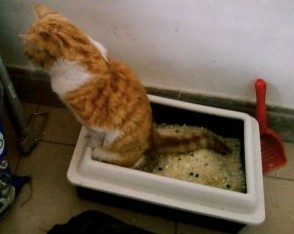
We love our cats, they are independent, versatile and intelligent creatures. Cats as any other pet, need maintenance. They may not bark at you every evening for a walk as dogs do, but they certainly need several things to be happy and one of them is a clean litter box.
Cleaning your cat litter box is one the most important tasks you need to do as a cat owner. Cats have a sense of smell much more sensitive than humans and their DNA is telling them all the time to be clean, very clean, it’s a mechanism of survival.
Cats in the wild are not confined to do their business in a 18” x 16” area. They walk and do their business anywhere, always in a clean spot. But we took them from their wild habitat and made them live indoor with us so we need to replicate their natural condition as much as we can. Also, by keeping the cat’s bathroom clean we not only prevent risks at home, but also some serious diseases that can affect our cat.
What could happen to your cat using a dirty litter box?
If you keep your cat’s litter box constantly dirty, your pet not only will suffer consequences on its health but also, it will be affected emotionally. The litter box is a very important part of that cat’s life and it shouldn’t never be neglected. The following are the main consequences of keeping a litter box dirty:
I. PHYSICAL HEALTH PROBLEMS
Feline Urethral Obstruction. Cats don’t appreciate dirty litter boxes and they will hold in the urine before using it. The longer you take to clean the litter box, the longer your cat will hold in the urine. Holding in the urine often is not a normal cat behavior and by doing this the urine starts getting more concentrated which leads to the formation of crystals or stones or even mucous plugs in their urethra. This leads to Feline Urethral Obstruction (FUO) that is a painful condition and could lead to kidney blockage which is a life threatening condition in cats.
Urinary Tract Disease & Bladder Inflammation. Feline Lower urinary tract disease and/or bladder Inflammation can also occur from your cat holding in the urine frequently. This behavior is not even noticed by you. As long as the litter box is dirty and your cat is reducing its urinating frequency, your pet will be at risk of getting urinary issues.
II. BEHAVIORAL PROBLEMS

Rejecting the Litter Box. When cats see a dirty litter box they just do their business outside because after all, if outside the litter box is cleaner than inside why not right?
Sometimes, the cat doesn’t even mean to do its business outside the litter box but as the litter area is covered with clumps, the cat will try to stand up on the clean litter so eventually its ass will be pointing out the litter box, with the well known “accidents”. Cats will always avoid standing up on waste or dirty litter, why? Because they are very clean animals that are constantly grooming themselves. If a litter box is dirty they will reject putting their paws on the feces or urine because they need them clean to keep grooming themselves, it makes sense, doesn’t it?
III. PSYCHOLOGICAL PROBLEMS
Stress. A cat that uses constantly a dirty litter box is an unhappy cat. The area where cats do their business is very important for them and the lack of cleanliness every time they need to use them makes them feel just as you would feel if you had to do your business in a dirty public bathroom every time. Stress can occur if your cat is constantly trying to look for a clean spot in a dirty litter box, specially if your pet is picky and clean.
Also, cats in the wild urge to cover their business in order to protect themselves from predators. This instinct is still living in your cat’s DNA so having a clean area to cover the feces and urine is fundamental. Cats feel the lack of comfort and why not, the lack of love when the conditions where they live are not the ones they need to be happy.
WATCH A CAT ASKING ITS HUMAN TO CLEAN THE LITTER BOX
How Often Should You Clean The Litter Box?
The general rule when having one cat is cleaning the litter box twice a day, in the morning and in the evening. If you have two cats you need to keep one litter box for each so the scooping adds up to 4 times a day.
There is a way to get away with this rule though, an automatic litter box. With a self cleaning litter box you don’t have to scoop twice a day or in case of having 2 cats, 4 times a day. As these units self clean each time the cat uses it your feline friends will enjoy a clean and fresh litter area at all times and best of all, you don’t need to scoop! If you have 2 cats one automatic litter box will do the job.
If you can’t keep up with your cat’s litter box, learn how self cleaning litter boxes work and prevent possible issues for your cat. Take action now, don’t wait.
Some content contains affiliate links or samples for reviews; I may receive compensation. Learn more